MO Republicans choose Donald Trump as presidential candidate in county level caucuses
In a landslide victory, Missouri Republicans chose former President Donald Trump as its choice for the party’s 2024 presidential candidate.
The Greene County Republican caucus concluded Saturday after only two hours. Participants had the opportunity to voice their choice for the presidential candidate.
The field of eligible candidates nationally had grown slim, with only Donald Trump, Nikki Haley and David Stuckenberg remaining in the race for the Republican nomination.
Party-reported results from the statewide caucuses arrived earlier than expected, with the Missouri Republican Party announcing that Trump had won all 114 counties and the city of St. Louis.
"Missouri Republicans have spoken loud and clear today, affirming their trust in President Trump's leadership and rejecting the failed policies of the Democrats in Washington", said Nick Myers, Chairman of the Missouri Republican Party.
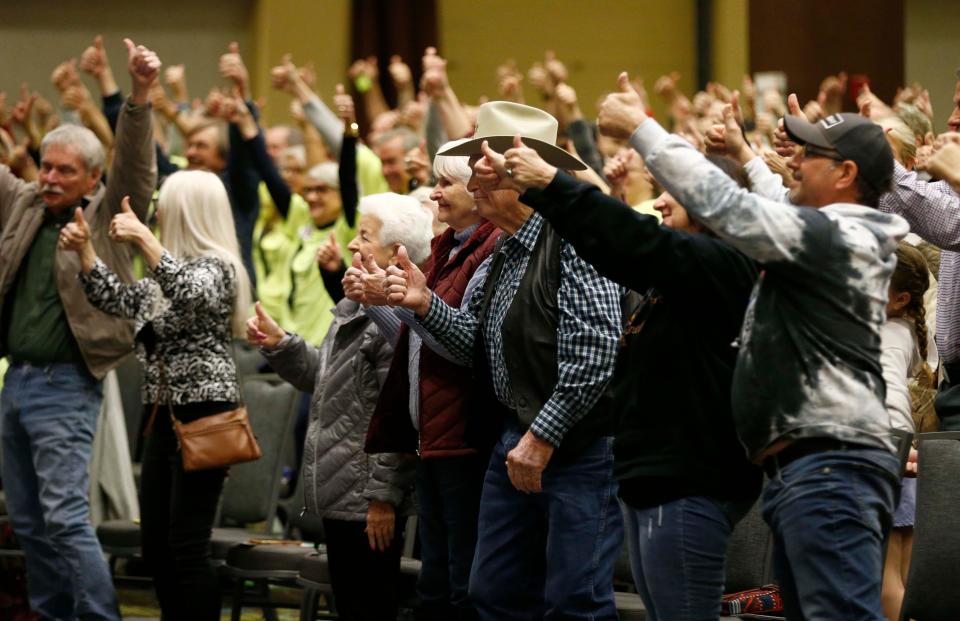
The shift to a caucus system is a recent change, and this is the first presidential election in which county level caucuses were used since 1996. A county level caucus was held in 2012 by the Missouri Republican Party after the presidential preference primary was scheduled in February, in violation of the national party rules.
Both Democratic and Republican parties mandate that Missouri’s primary must be held no earlier than March. State lawmakers approved a shift back to the caucus system in 2022. Efforts to reverse the change in the 2023 legislative session were unsuccessful, and similar attempts have gained no traction this legislative session.
Some were concerned that this year’s caucuses would be chaotic, since it is the first caucus to be held since the impromptu caucuses in 2012.
However, Danette Proctor, chair of the Greene County Republican Central Committee, was pleased with how smoothly thing went. She indicated that the uniformity of rules used in county level caucuses across the the state simplified the process, which was much messier during the 2012 caucuses.
Trump easily wins the Greene County Republican Caucus
Participants gathered in the Oasis Convention Center in Springfield for the caucus. At 10 a.m. the caucus commenced with a prayer, and recognition of the local and statewide office-holders from Greene County, as well as veterans, law enforcement, firefighters and teachers. Various conservative groups shared information about their respective organizations.
Former U.S. Congressman Billy Long spoke to the crowd, capturing a selfie of the crowd in the background and voicing his intention to send it to former President Donald Trump. He signaled his intention to support Trump at the caucus.
Greene County Clerk Greene Schoeller, the head of the caucus credentials committee, said that 517 qualified participants were in attendance, meaning that any candidate with 259 attendees in support would win all of the Greene County delegates.
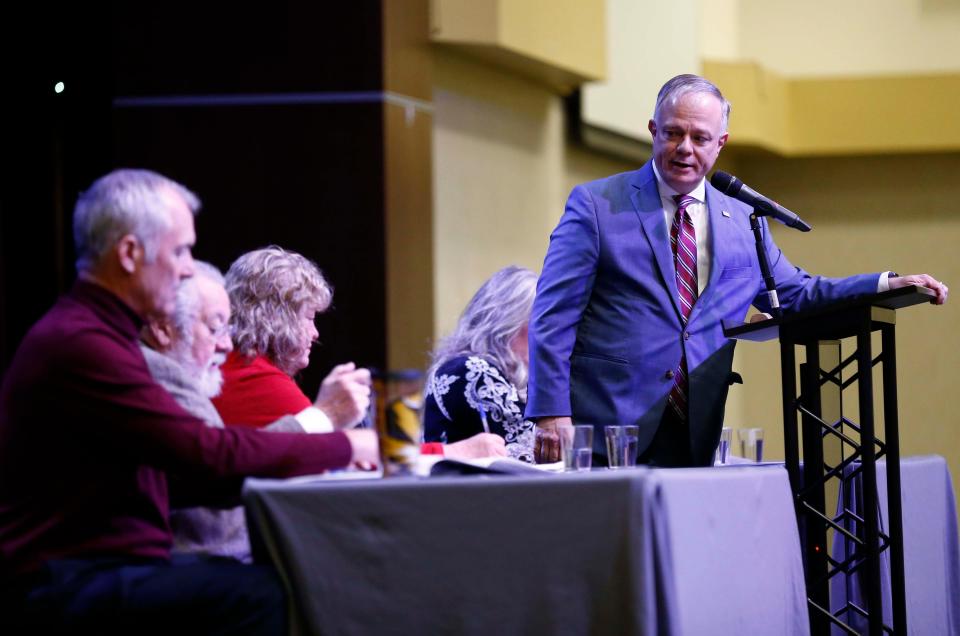
If no candidate received support from more than 50% of the caucus-goers, then the delegates would be split between candidates with at least 15% of attendees in support. At least 78 participants must support a candidate in order for that candidate to be eligible to receive delegates.
Danette Proctor was unanimously elected the caucus chair, and Sonya Anderson was unanimously elected as caucus secretary.
Proctor explained the caucus rules before opening the floor for nominees of the candidate to serve as the next U.S. President. Donald Trump, Nikki Haley and David Stuckenberg were the only candidates eligible for nomination. As Proctor announced the names of the candidates, the crowd erupted in cheers for Trump, but sharply turned to silence as Haley and Stuckenberg were announced.
As Proctor opened up the floor for nominations, Long took the floor to speak to his personal relationship with Trump, sharing the story of how he coined the phrase "Trump train." He encouraged caucus participants to board the "Trump train" with him and make Trump the 47th U.S. President, to thunderous applause from the audience.
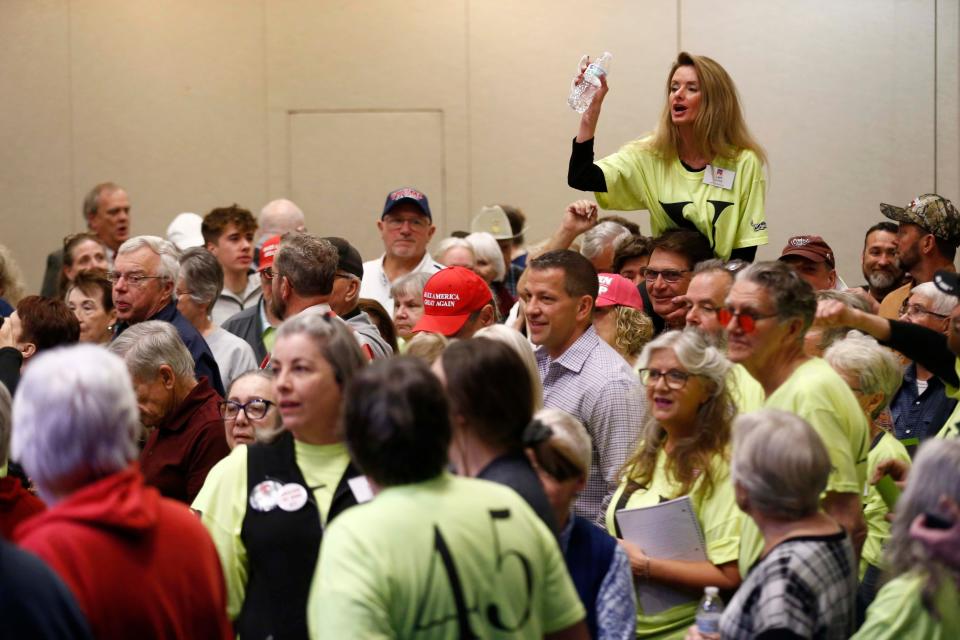
When Proctor asked for additional nominations, the crowd again went silent. After a moment, caucus participant Becky Thomas came forward to nominate Nikki Haley. She said that Trump lost her support during his last campaign, and he had failed to regain her vote.
Thomas expressed disappointment that her husband, who serves in the military, was unable to participate in the caucus due to its in-person nature. Her speech in support of Haley earned scattered applause.
Stuckenberg received no nominations from the crowd.
As the crowd dispersed to break into groups supporting their chosen candidates, Trump overwhelmingly drew the majority of participants. The small group of Haley supporters was hard to spot through the throngs of Trump supporters, which included 479 of the participants.
Haley’s group had only 38 supporters, missing the minimum of 78 people in support required to be eligible to receive delegates. Her supporters were invited to join the Trump crowd, although it was not required.
More: Mark your calendar with these important 2024 Missouri election dates
Former U.S. Rep. Billy Long celebrates a Trump victory in Missouri
Long, the spokesperson for the gathered group of Trump supporters, heralded the victory for Trump and shared that he’d already sent the caucus selfie to the former president.
In an interview following the Greene County caucus results, Long touted Trump’s popularity among Republicans and his presidential record as reasons for the quick victory.
“None of us have ever seen a politician like this before in our lifetime,” Long said. “And I think that's worth noting he can fill any stadium, any arena, anywhere. It's a movement.”
Long indicated that, if asked, he “most certainly would work in the Trump administration,” should Trump win the election.
“He's mentioned that he wants me to do that, but he says a lot of things, and a lot of people get in his head between now and then,” Long said.
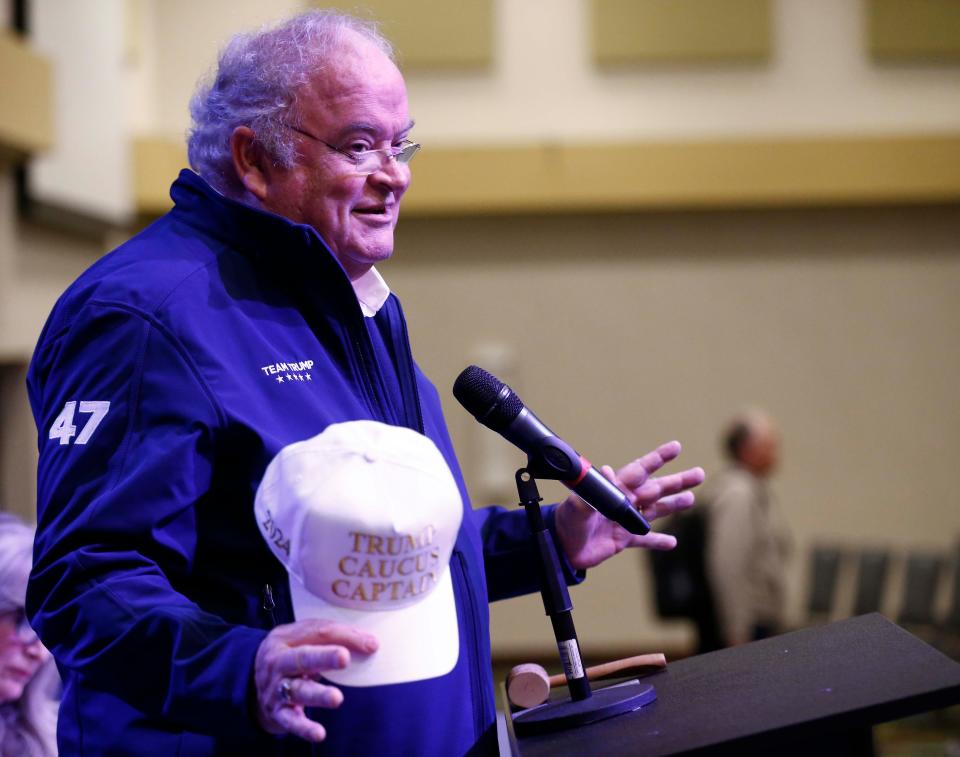
Following the proclamation of Trump's victory, caucus officials began the process of selecting delegates and alternates to represent the county at the state and congressional conventions.
The nominated slate of delegates and alternates were approved, advancing 42 people to represent Greene County at the GOP's state, congressional and national conventions, where other county delegates will continue the process of nominating the party's presidential candidate.
There were 42 alternates approved in case any of the 42 delegates are unable to attend any of the designated conventions.
Caucus attendees suggest changes to the Missouri Republican Party Platform
As the caucus shifted gears to revising the Missouri Republican Party Platform, the crowd began to grow sparse, with at least a third of participants leaving during the portion of the caucus reserved for discussing platform changes.
The Missouri Republican Party Platform is revised every 10 years, and each county has the opportunity to suggest changes and amendments. The changes approved by the body of the caucus will then be sent to the congressional conventions, where delegates will again discuss the suggested changes and decide which revisions are included in the new party platform.
Some of the changes that Greene County Republicans want to see in the new party platform include expressed support for the abolishment of the U.S. Department of Education and repealing the Outstanding Schools Act so that the Missouri Department of Elementary and Secondary Education reverts to its “original role in supporting locally elected school boards.”
This measure passed with unanimous approval from caucus attendees, meaning that it will be considered by the Missouri Republican’s congressional convention later this year.
Another suggested revision, from Steve Lampley of the Missouri Republican Assembly, pushed for phrasing in the platform that would indicate Missouri’s refusal to comply with federal laws on topics that should be under state jurisdiction.
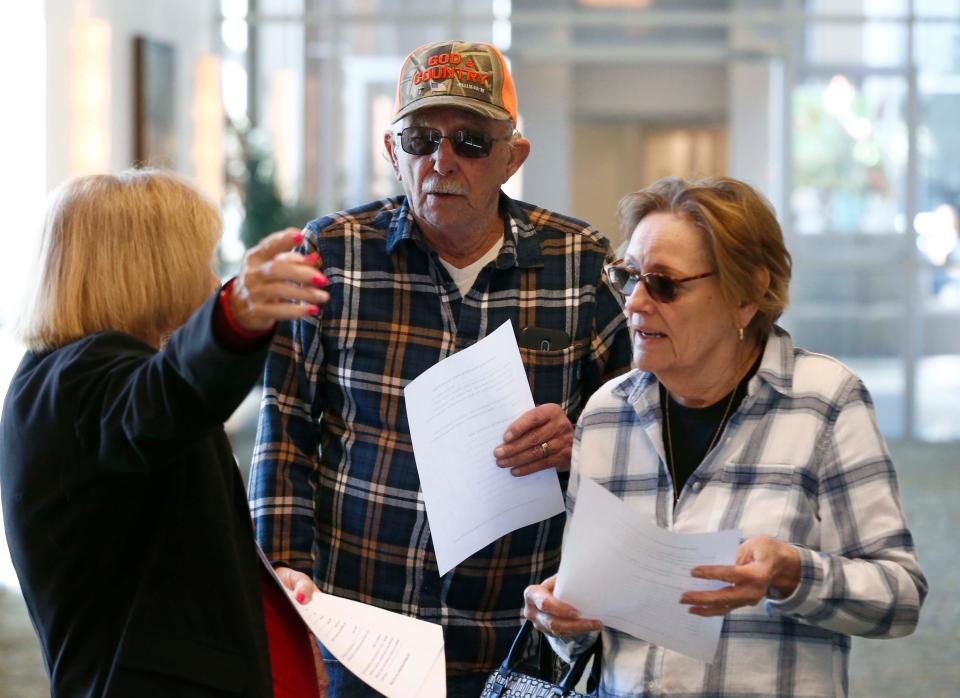
“Our Missouri Republican elected officials should use anti-commandeering doctrine whenever the federal government exceeds its constitutional limits,” Lampley said.
State Rep. Darin Chappell offered discussion on this suggested revision, pointing to the 10th amendment to the U.S. Constitution, which prohibits federal overreach into state affairs.
“This ought to be our platform, and your elected officials ought to have the backbone and the determination to stand up as a father between a runaway national government and the sovereignty of this state,” Chappell said.
This revision also passed with unanimous approval.
Another revision was suggested that would support Missourians having the right to refuse any medical treatment that they don’t wish to have performed on them, with specific focus on the COVID-19 vaccine and the uproar tha ensued when that vaccine was mandated during the pandemic. This measure passed, with only a few members in opposition.
Another proposed was approved that would change the platform to indicate that it is the will of the Missouri Republican Party that no public official can infringe upon the freedom to worship or hold religious meetings, with an amendment approved to indicate that that freedom extends to worshiping “God, like our founding fathers presented in the Constitution.”
Rep. Melanie Stinnett proposed a revision to show support for all Missouri counties to establish a constitutional sheriff. This is not currently required in the state.
“By having constitutional protection sheriff's can operate independently from political pressure and special interest, ensuring they prioritize upholding constitutional rights including due process, equal protection and freedom from unlawful searches and seizures,” Stinnett said.
According to Stinnett, other benefits of this would be the ability for these constitutional sheriffs to serve as a “vital check on potential abuses of power by other branches of government, including federal agencies or state authorities.”
“They serve as a last line of defense against overreach protecting citizens from potential violations of their rights by other governmental entities,” Stinnett said.
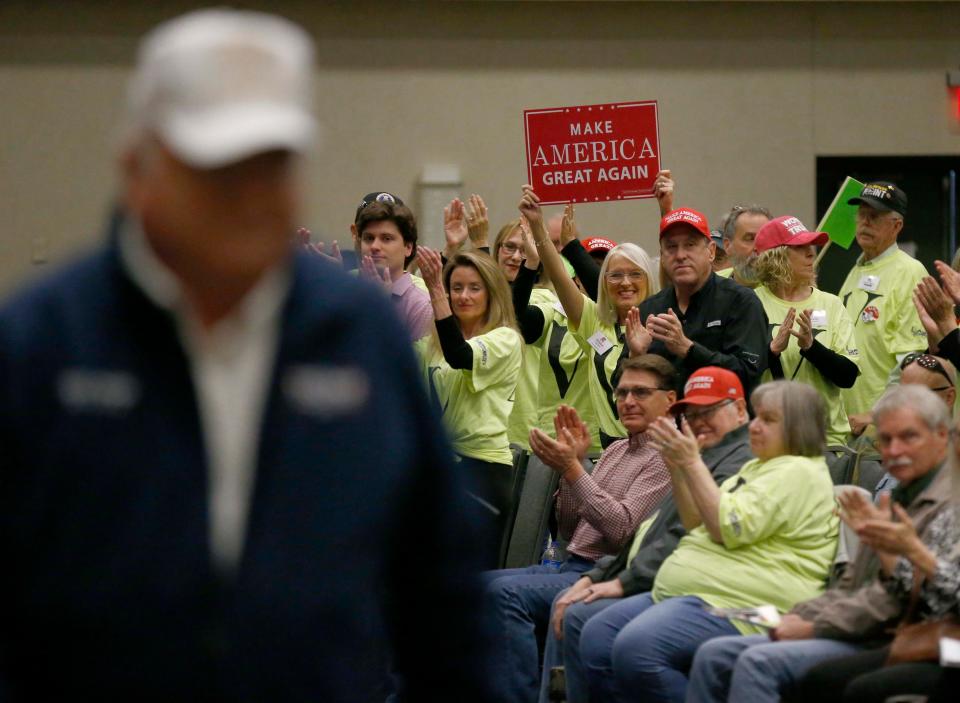
Stinnett’s proposed revision gained the approval of caucus-goers.
Another change called for the platform to include the following phrase: “In order to maintain the integrity and branding of the Missouri Republican Party and fidelity to the principles of this platform, every candidate shall sign a pledge to our platform. Subsequently while in office, every office holder must maintain a voting record that demonstrates a preponderance of compliance to our platform and uphold their oath of office.”
Failure to follow that rule would result in disassociation from the Republican party, which would not accept the would-be candidate's filing fee if they tried to run as a Republican. Those who spoke in opposition wanted to know who would decide which Republicans were worthy to run, voicing concerns that party insiders could block party outsiders from running for office.
Rep. Chappell indicated that he did not support the amendment, since the Republican Party Platform, as it stands, is not perfect and contains some items that he could not support.
“This is why we struggle with vetting,” Chappell said. “I'm vetted; I’ve got no problem being vetted. I've got nothing to hide, but the reality of it is a one-size-fits-all mentality when it comes to the platform, when the platform is not perfect, I'm sorry, I can't sign off on it.”
The proposed revision failed to gain the approval of caucus attendees.
This article originally appeared on Springfield News-Leader: Donald Trump wins Missouri's Republican county level caucuses
